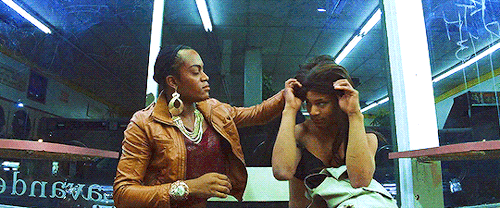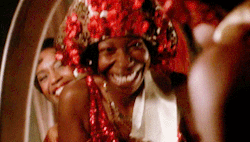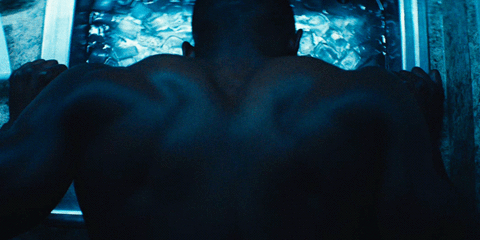
June 1st marks the beginning of Pride Month, but for those of us keeping up to date with current affairs it's never felt more inappropriate to have a party. In light of the absolutely horrifying murder of George Floyd by four police officers last week, I've decided that my annual Pride Month post will focus on uplifting the stories and artistry of black and queer filmmakers and actors. There's a sure chance you'll have heard of some of these films already, there's also a fair chance that some of these have flown under your radar. Either way, I hope you'll consider streaming one of these films during the next month in support of black queer artistry.
TANGERINE (2015)

While oft discussed by cinephiles, Tangerine remains relatively unknown to the mainstream movie-going audience. Director Sean Baker took to the streets of Hollywood in 2014 with nothing more than a vision, an iPhone and a Mac with FinalCut Pro - the result is one of the most ground-breaking dramas of the 2010s. The film centres on Sin-Dee Rella, a trans woman who seeks revenge on her boyfriend after getting out of prison and discovering he's been cheating. What follows is a screenplay that explores the politics of sex work, trans fetishization and the unparalleled importance of sisterhood. Indeed, at a time when black trans women are being murdered at alarming rates, it has never been more important to uplift their stories.
I AM NOT YOUR N*GRO (2016)

Before his untimely death in 1987, activist and author James Baldwin had been working on a book detailing his experiences with Malcolm X and Martin Luther King. Remember this House, as the unfinished manuscript was called, was later adapted into I Am Not Your N*gro, a BAFTA Award winning documentary narrated by the ever-brilliant Samuel L. Jackson. James Baldwin's 1974 novel If Beale Street Could Talk was recently translated onto the silver screen by Barry Jenkins - if you want to learn more about the storyteller, look no further than this truly special doc.
THE COLOR PURLPLE (1985)

Alice Walker's seminal text is one of the United States' most-banned books (on account of its frank depictions of homosexuality, racial violence and foul language), but The Color Purple has none the less stood as one of the most acclaimed black queer novels. Its film adaptation, starring Oprah Winfrey and Whoopi Goldberg, was released in 1985 to huge critical acclaim. The film walked into the 1986 Academy Awards with a mind-blowing 11 nominations - in true #OscarsSoWhite fashion, though, The Color Purple left empty-handed.
MOONLIGHT (2016)

The colour purple holds significance for queer black women on film, but, "in moonlight, black boys look blue." Moonlight is split into three acts, each depicting our protagonist - Chiron Harris - at different stages of his life. This Barry Jenkins film depicts black male homosexuality with a boldness and a beauty rarely witnessed on the screen; it is, for all intents and purposes, a cinematic masterpiece. The film went on to take the 2017 Academy Awards by storm, winning three of its eight nominations and infamously beating out La La Land for Best Picture.
THE DEATH AND LIFE OF MARSHA P. JOHNSON (2017)

Times like these make it necessary to remind ourselves that the first Pride was a protest against police brutality. Marsha P. Johnson was one of the black trans women who helped to instigate the Stonewall Riots of 1969, and helped to ensure the rights that keep LGBTQ people relatively safe today. Netflix's documentary The Death and Life of Marsha P. Johnson was curated by David France (the AIDS activist who also directed 2012's How to Survive a Plague), and has been labelled "essential for anyone interested in learning how to make a loud-and-proud stink". This Pride Month more than ever, we must make sure to acknowledge the heroes like Marsha who fought against police brutality and for queer rights during a time when nobody else would.
* * *
A note about George Floyd:
Violent heteronormativity is no stranger to white supremacy, and one cannot be dismantled without the other being toppled too.
Even one black life lost to white supremacy is one too many and yet thousands more have died. The latest victim of police brutality is George Floyd, whose murder was broadcast on camera for the world to see as he, compliant with the law, was asphyxiated by an officer with a history of violent offences and an affiliation with the KKK.
White people: we have to speak up. We have to. You do not have to be black to be enraged.
It feels alarming that this sentiment is considered remotely controversial, but Black Lives Matter.
If possible, please consider donating to the Act Blue Freedom Fund, which splits your donation between 38 fundraisers including the LGBTQ Freedom Fund, the Philadelphia Bail Fund and the Minnesota Freedom Fund:
Thank you.
Note: I do not own any of the externally sourced GIFS featured on this post.
Written by James Green
